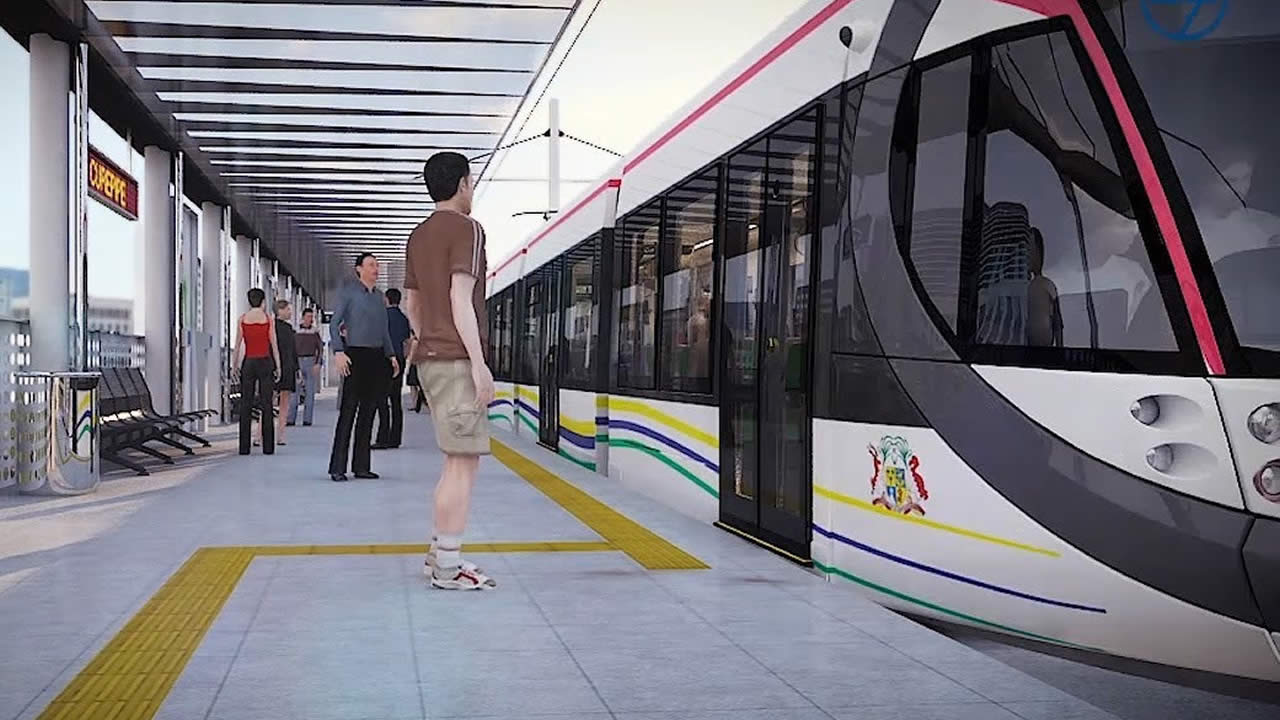
The year 2018 has been a major challenging one for the country, with major happenings on the socioeconomic front. As has been the trend during the past few years, the economy is almost dominated by the construction and real estate sector, but this year, public sector investment failed to keep pace with public sector infrastructural development. On the social side, some public projects have disturbed the lives of citizens, prompting them to protest.
2018 can be said to be the year of the Metro Express, a project that has been on the cards for nearly three decades and that has seen firm grounds this year. While the current government had campaigned against the ‘metro léger’ during the 2014 electoral campaign, once in power, it took a surprising U-turn in 2017 and decided that the Metro project is indeed a must for the country. No sooner said than done, with the laying of the foundation ceremony held on 28th September 2017, and major works officially beginning on 16th January 2018. The first rails have been laid on 26th November 2019. If all goes well, the first train ride is scheduled for September 2019!
But the journey so far has not been all smooth. The project met severe resistance from those evicted after their properties were compulsorily acquired by the Government. Then there was major outcry against the uprooting of trees and disappearance of green spaces to make way for the Metro line. Motorists have also been affected following closure of certain roads and complicated diversions. The accidental damage caused to the sewerage network in Rose Hill stirred a hornet’s nest and to this day, traders are still complaining of reduced sales because customers are shunning certain commercial zones due to inconveniences. There have also been cases where residents affected by the sequels of the project are suing the contractor for damages and compensation.
On its side, the Metro Express management team seems to have learned some lessons, which will help it better plan and prepare and handle issues when the next phase, from Rose Hill to Curepipe, through Quatre Bornes, kicks off.
The year 2018 has also seen many incentives launched to encourage the emergence of micro and small and medium enterprises. SME Mauritius Ltd, a new organization, took over the Small and Medium Enterprises Development Authority (SMEDA) to boost entrepreneurship. Other measures have been taken to further streamline administrative procedures and improve the investment climate. In that regards, Mauritius also improved its ranking and is now at the 20th position in the World Bank Doing Business survey. Sound macroeconomic policies have also contributed to this achievement.
Government has attempted to increase efficiency, reduce expenditure and boost productivity by merging institutions having more or less similar functions and objectives. Thus, following the amalgamation last year of six public entities, namely the State Land Development Company Limited, the State Property Development Company Limited, Business Parks Mauritius Limited, Belle Mare Tourist Village Ltd, Le Val Development Ltd, and Les Pailles Conference Centre Ltd, this year saw the coming into operation of the Economic Development Board, the result of a merger of the Board of Investment, the Enterprise Mauritius, the Financial Services Promotion Authority and the Africa Centre of Excellence. However, there seems to have been cohabitation problems, with institutions losing sight of the wider public expectations and delving in micromanagement.
On the positive front, the economy saw the advent of the Negative Income Tax and the implementation of the Minimum Wage. According to statistics, job creation outnumbered redundancies. Public sector investment has been higher than in previous years, and this year even outshined private investment. In early December, the Government announced a wage compensation of Rs 400 as from January 2019, and recently a pack of social measures has been announced for those at the bottom end of the ladder. Digital Mauritius is on the move, with various online platforms improving public administration, especially the National E-Licensing System.
On the dark side, the economy witnessed a spiraling public debt level, exceeding Rs 307 billion at the end of September 2018, equivalent to 64% of GDP, with a large chunk being used to fund infrastructural projects, mainly under the Road Decongestion Programme. While the inflation rate appears to be under control, the population still faces rising cost of living, with Consumer Watchdogs and Trade Unionists claiming the official basket of goods used to determine inflation no longer represents consumption pattern of a typical Mauritian. Waste of public funds remains rampant, as was symbolised by the Albion bus stop, among others.
The Bank of Mauritius forecasts a GDP growth of 4% for the year 2018, higher than the estimate of Statistics Mauritius, which is 3.9%. Overall, Statistics Mauritius is very optimistic about growth in our main economic sectors, with construction topping the list, its growth estimated at 9.5%. The ICT sector is likely to grow by 5.6%, the financial services sector by 5.5% and the hospitality sector by 3.6%. The two main sectors lagging behind are agriculture (0.8%) and manufacturing (0.9%). Unemployment rate is contained at less than 7%. The forecast of total tourist arrivals for 2018 is set at 1,395,000 while the figure for 2017 was 1,341,860.
| Rate | Year 2017 | Forecast 2018 |
| GDP Growth | 3.80% | 3.90% |
| Inflation | 3.70% | 3.30% |
| Unemployment | 7.10% | 6.90% |
| FDI (Rs Billion) | 17.5 | 20 |
| Tourism (No. of arrivals) | 1,341,860 | 1,410,000 |
Vansheeta Kewal-Veerapen : “The economy experienced a progressive shift from traditional sectors to services”
 Business Development Executive at Apollo Blake, Vansheeta Kewal-Veerapen recalls that Mauritius remains the top ranking country in overall governance in Africa for the twelfth consecutive year, according to the Mo Ibrahim Index of African Governance (IIAG) 2018. On the US-based Freedom House index, it ranked first in terms of political rights and second on civil rights. She quotes Alex Vines, head of the Africa Programme of the London-based think-tank Chatham House, who said, “This year, Mauritius marked its 50 years of Independence and is an African success story.”
Business Development Executive at Apollo Blake, Vansheeta Kewal-Veerapen recalls that Mauritius remains the top ranking country in overall governance in Africa for the twelfth consecutive year, according to the Mo Ibrahim Index of African Governance (IIAG) 2018. On the US-based Freedom House index, it ranked first in terms of political rights and second on civil rights. She quotes Alex Vines, head of the Africa Programme of the London-based think-tank Chatham House, who said, “This year, Mauritius marked its 50 years of Independence and is an African success story.”
Nevertheless, Vansheeta believes that the biggest challenge in 2018 for organisations is to find their place in the global economy. “As a small island country with a narrow domestic skills’ base and an ageing population, the realisation of this ambition will hinge on improving the education system and addressing current constraints to labour participation and productivity.” She adds that, in addition to market forces, the complex system of Remuneration Orders contributed moderately to the rise in wage inequality. “Remuneration Orders not only contributed, although modestly, to increasing inequality but also had a small negative employment effect in the covered sectors. Simple and enforceable minimum wage policies set at meaningful levels are keys to successfully protecting low-wage workers.”
The rapid growth in wage inequality is attributed to the skills shortage created by structural changes that occurred in Mauritius over the last decade. The economy experienced a progressive shift from traditional and low-skills sectors including agriculture and manufacturing, particularly textiles, to services, notably professional, real estate, and financial services. This transformation generated a considerable increase in the demand for skilled workers that was not matched by an equally rapid increase in the supply of skilled workers, notwithstanding the significant improvements in educational attainments of the Mauritian population.
She states that the Mauritian labour market continues to be increasingly characterised by the education mismatch, particularly among the youth, and by unemployment among highly educated youth. Employers, especially in the BPO sector, do not easily find workers with the adequate technical and soft skills and past working experience for the job they offer.
The business world has been riding over the waves of technological disruptions over the past few years and with a surge in applications of technologies of the future, especially in 2018: Artificial Intelligence and machine learning are inextricable links to make businesses more agile and productive. Mauritius has been relatively successful to embark over the wave of technological disruption with the measures announced to promote and accelerate the pace of technological innovation. On the other hand, it is becoming increasingly complex in 2018 and the years to come, of how to leverage technology in business without being a direct threat to employment.
 J'aime
J'aime













